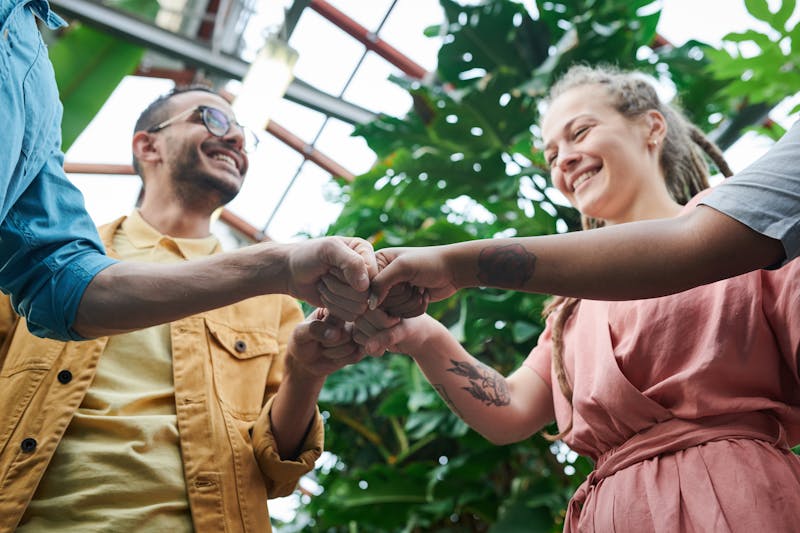
In my journey exploring the idea of time banking, I have come across many similar expressions of the same core values—community, compassion, valuing others, investing in the well-being of others, cooperation rather than competition, sustainability, equity, altruism, and other such utopian concepts.
These ideals resonate deeply with the vision of a world where human connections and collective well-being take precedence over material gain and profit. Inspired by these values, I propose an alternative economic system, which I call a “participatory community,” rooted in the principle of a “giving economy.”
The Vision of a Giving Economy
Unlike the current “taking economy,” which prioritizes profit, consumption, and individualistic gain, a giving economy focuses on fostering relationships, shared resources, and the collective flourishing of all members of a community. It redefines the concept of value by centering it on human needs, empathy, and reciprocity rather than on monetary profit and material accumulation.
By synthesizing the best ideas from time banking, time co-ops, intentional communities, mutual credit, cooperative economies, co-production, mutual aid networks, local exchange trading systems, and decentralized currencies, we can create a holistic framework for this system. The participatory community would represent an efficient, equitable, and people-centered alternative economic model that reimagines how we meeting our own needs and those of others.
Core Principles of the Participatory Community
Community-Centered Value: Every individual’s contributions, whether they be caregiving, teaching, building, or creating art, are equally valued. Time becomes the universal currency, recognizing that all labor and participation hold intrinsic worth.
Equity and Inclusion: The system is designed to be inherently equitable, ensuring that everyone has access to resources and opportunities regardless of their socioeconomic background. It prioritizes the needs of underserved communities, the elderly, impoverished groups, and immigrants.
Reciprocity over Competition: Members are encouraged to contribute according to their abilities and receive according to their needs. This fosters a culture of cooperation and mutual reliance, reducing the adversarial nature of traditional market economies.
Sustainability: The giving economy emphasizes sustainability, both ecological and social. By localizing production and resource-sharing, it minimizes waste and supports long-term environmental stewardship.
Decentralized Governance: Decision-making is participatory and decentralized, empowering local communities to manage resources and resolve disputes collaboratively.
The Structure of the Giving Economy
A Unified Credit System
The cornerstone of this system would be a mutual credit network that operates on a time-based ledger system. Each individual’s contributions—be it an hour spent tutoring, repairing a neighbor’s roof, or preparing meals for a community event—would be recorded as credits in a decentralized ledger. These credits would then be used to ensure equity of participation within the community.
Community Hubs
Physical or digital community hubs would serve as spaces where members could offer and request services, share surplus resources, and collaborate on projects. These hubs would act as centers for relationship-building and resource distribution.
Intentional Communities
The participatory community would encourage the creation of intentional neighborhoods or networks where members would agree to pool resources such as tools, transportation, and shared spaces. These communities would prioritize trust, cooperation, and shared responsibility.
Cooperative Enterprises
Local businesses and services would operate as cooperatives, owned and managed collectively by workers and consumers. Profits, instead of being siphoned off by shareholders, would be reinvested into the community.
A Culture of Co-Production
The system would promote co-production—where citizens actively participate in designing and delivering services rather than being passive consumers. This could include anything from co-managed healthcare to community-led education initiatives.
Potential Impacts
A participatory community based on a giving economy could have profound effects on society:
Economic Resilience: By decentralizing economic activity and emphasizing local self-reliance, communities would become more resilient to external shocks like economic downturns or supply chain disruptions.
Social Cohesion: The emphasis on reciprocity and mutual aid would strengthen interpersonal relationships and reduce isolation.
Reduced Inequality: A system that values all contributions equally could help bridge the gap between rich and poor, creating a more equitable society.
Environmental Benefits: Localized and sustainable practices would reduce the ecological footprint of economic activity.
Challenges and Implementation
Implementing such a system would require careful planning and experimentation. Challenges might include:
Cultural Shift: Moving from a profit-driven mindset to a people-centered ethos would require education and sustained cultural change.
Scalability: Developing scalable models that maintain local autonomy while fostering inter-community collaboration would be essential.
Technological Barriers: Ensuring access to the digital tools needed for decentralized governance and mutual credit systems would require investment in infrastructure.
Pilot projects in diverse communities could serve as test beds for the participatory community model. By starting small and building on successes, the framework could gradually expand, adapting to different cultural and economic contexts.
In a Nutshell
The participatory community and its giving economy would represent a bold reimagining of how we live and work together.
By prioritizing relationships, equity, and sustainability, it could offer an antidote to the alienation and inequalities of our current economic systems. This vision is not just utopian; it is a pragmatic blueprint for a world where every individual’s value is recognized and celebrated.
Together, we can build a future that is person-centered rather than profit-centered, grounded in the timeless principles of compassion and cooperation.
Join us in making the world a better place. You’ll be glad that you did. Cheers friends.